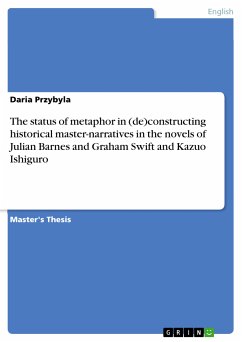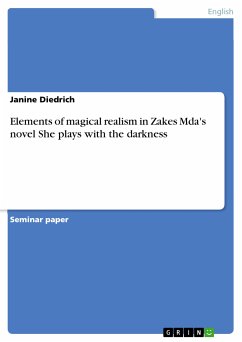Master's Thesis from the year 2007 in the subject English Language and Literature Studies - Literature, grade: A, University of Silesia, language: English, abstract: The following thesis consists in an attempt at synthesising several problems connected with narrating historical representations by means of metaphors. It examines the functions metaphorical narratives may attend in order to (de)construct historical identities as well as the places metaphors may occupy in the order of discourses. Divided into three chapters, the dissertation deals with the ‘spectacular’ and the ‘performative’ potential of figurative speech assembled in historical narrations that are, in quite distinct fashions, presented in selected novels by Julian Barnes, Graham Swift and Kazuo Ishiguro. The methodological profile of the analysis conducted in this thesis is centralised on the deconstructionist notion of metaphor as well as certain poststructuralist conceptions of power relations. But despite the fact that most theoretical inspirations are drawn from the philosophy of Jacques Derrida and Michel Foucault there appear also other names and theoretical sources. Among these quite a substantial role can be assigned to literary criticism developed between 1950s and 1990s in Great Britain and elsewhere in Europe, feminist critique along with its various orientations, psychoanalytic writings as well as texts authored by philosophers and critics linked more to structuralist tradition and New Criticism rather than deconstruction such as Paul Ricoeur, Roland Barthes, Mikhail Bakhtin, Wolfgang Iser, Stanley Fish or Walter Benjamin. The first chapter, Metaphoricised Historiography, as its title implies, serves as a short introduction to the intricacies of post-war British history and its impact on literature. The next chapter entitled History as Spectacle deals with recontextualising and manipulating historical scenes. And the last chapter, History as Performance, addresses a certain type of historical sensitivity. It is discussed on the examples of visual arts and the situation of historical painting in the context of being objectified in endless interpretative circulation in galleries and museums. On the whole, the dissertation tries to estimate the significance of metaphors in discourses narrating historical identities.
Hinweis: Dieser Artikel kann nur an eine deutsche Lieferadresse ausgeliefert werden.
Hinweis: Dieser Artikel kann nur an eine deutsche Lieferadresse ausgeliefert werden.









